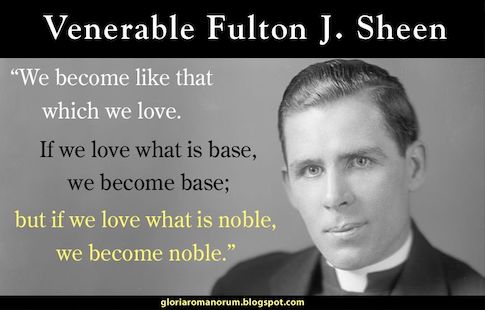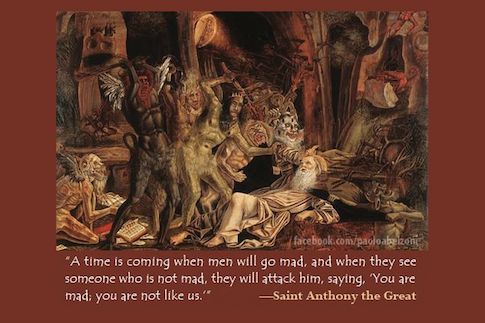 |
| Fresco of Christ's Descent into Hell from the lower Basilica of San Clemente in Rome, 9th Century AD.
In this detail, Christ takes Adam by the hand to lead him out of the underworld. |
Every Christian knows that on Holy Thursday, we remember the Last Supper, and that Good Friday is the day on which the Lord was crucified and died.
Holy Saturday, however, is different. For most Christians, it is a peaceful time – a day of reflection separating the drama and sorrow of the Passion from the joy of Easter Sunday. On Holy Saturday, there is seemingly not much going on. For the modern Church, it is a quiet time of watching and waiting.
But the traditional teachings of the ancient Church tell a much different story. Something tremendous on a cosmic scale happened on Easter Saturday: Christ’s descent into Hell.
Often called the Harrowing of Hell in English, or the Anastasis in Greek, we find this mysterious event recorded without elaboration in the Apostles’ Creed:
“He descended into Hell.”
It is rumored that Mel Gibson’s follow-up to The Passion of the Christ will attempt to bring this event to the big screen as part of the larger story of the resurrection of Christ. How he will do that is anyone’s guess. But you can bet it will be epic. And probably gruesome.
The harrowing of Hell is mentioned obliquely in Sacred Scripture, most specifically in First Epistle of St. Peter, where the Apostle says:
"Because Christ also died once for our sins, the just for the unjust: that he might offer us to God, being put to death indeed in the flesh, but enlivened in the spirit, in which also coming he preached to those spirits that were in prison: Which had been some time incredulous, when they waited for the patience of God in the days of Noah, when the ark was a building: wherein a few, that is, eight souls, were saved by water." [1 Peter 3:18-20]
This mysterious passage from the Gospel of Matthew is similarly used to support the Harrowing of Hell:
"And the graves were opened: and many bodies of the saints that had slept arose, And coming out of the tombs after his resurrection, came into the holy city, and appeared to many." [Matthew 27:52-53]
Saint Paul also mentions Christ's descent into the underworld in his Letter to the Ephesians:
"But to every one of us is given grace, according to the measure of the giving of Christ. Wherefore He saith: Ascending on high, he led captivity captive; he gave gifts to men. Now that he ascended, what is it, but because he also descended first into the lower parts of the earth? He that descended is the same also that ascended above all the heavens, that he might fill all things." [Ephesians 4:7-10]
Though Christ’s descent into Hell is not described in detail in Sacred Scripture, the event was most certainly an article of faith for the ancient Church. One of the earliest references may be found in an ancient homily for Holy Saturday, sometimes attributed to St. Melito of Sardis, a bishop in Asia Minor who wrote in the late 2nd century AD, within 150 years of Christ's death and resurrection. The following passage from this homily is taken from the Vatican website. The sentences in bold are included in the Catechism of the Catholic Church (635):
"What is happening? Today there is a great silence over the earth, a great silence, and stillness, a great silence because the King sleeps; the earth was in terror and was still, because God slept in the flesh and raised up those who were sleeping from the ages. God has died in the flesh, and the underworld has trembled.
Truly he goes to seek out our first parent like a lost sheep; he wishes to visit those who sit in darkness and in the shadow of death. He goes to free the prisoner Adam and his fellow-prisoner Eve from their pains, he who is God, and Adam's son.
The Lord goes in to them holding his victorious weapon, his cross. When Adam, the first created man, sees him, he strikes his breast in terror and calls out to all: 'My Lord be with you all.' And Christ in reply says to Adam: ‘And with your spirit.’ And grasping his hand he raises him up, saying: ‘Awake, O sleeper, and arise from the dead, and Christ shall give you light.
‘I am your God, who for your sake became your son, who for you and your descendants now speak and command with authority those in prison: Come forth, and those in darkness: Have light, and those who sleep: Rise.
‘I command you: Awake, sleeper, I have not made you to be held a prisoner in the underworld. Arise from the dead; I am the life of the dead. Arise, O man, work of my hands, arise, you who were fashioned in my image. Rise, let us go hence; for you in me and I in you, together we are one undivided person.’" [Ancient homily sometimes attributed to St. Melito of Sardis]
 |
| 12th century mosaic of the harrowing of Hell from St. Mark's Basilica in Venice. |
Numerous other ancient Church Fathers commented on Christ’s sojourn into hell. Writing at about the same time as St. Melito, St. Clement of Alexandria speculated on the reason for the descent, saying:
“Wherefore the Lord preached the Gospel to those in Hades…. So I think it is demonstrated that the God being good, and the Lord powerful, they save with a righteousness and equality which extend to all that turn to Him, whether here or elsewhere….What then? Did not the same dispensation obtain in Hades, so that even there, all the souls, on hearing the proclamation, might either exhibit repentance, or confess that their punishment was just, because they believed not?... If, then, He preached the Gospel to those in the flesh that they might not be condemned unjustly, how is it conceivable that He did not for the same cause preach the Gospel to those who had departed this life before His advent?” [The Stromata of St. Clement of Alexandria, Book VI, Chapter 6]
Also active in the mid-to-late 2nd Century AD was Saint Irenaeus of Lyons, who wrote clearly concerning this belief on Christ's descent into Hell:
"It was for this reason, too, that the Lord descended into the regions beneath the earth, preaching His advent there also, and [declaring] the remission of sins received by those who believe in Him. Now all those believed in Him who had hope towards Him, that is, those who proclaimed His advent, and submitted to His dispensations, the righteous men, the prophets, and the patriarchs, to whom He remitted sins in the same way as He did to us, which sins we should not lay to their charge, if we would not despise the grace of God. For as these men did not impute unto us (the Gentiles) our transgressions, which we wrought before Christ was manifested among us, so also it is not right that we should lay blame upon those who sinned before Christ's coming." [St. Irenaeaus, Against All Heresies, Book IV, Chapter 27:2].
The context of this passage in Irenaeus's work, Against All Heresies, is complex and well worth reading in its entirety.
A more descriptive and fanciful account is rendered in the apocryphal Gospel of Nicodemus, which is thought to have been written in the Third or Fourth century AD and appended to the equally apocryphal Acts of Pilate about the Fifth or Sixth century AD. Here is a sample:
"...The Lord of majesty appeared in the form of a man and lightened the eternal darkness and brake the bonds that could not be loosed: and the succor of his everlasting might visited us that sat in the deep darkness of our transgressions and in the shadow of death of our sins.
When Hell and death and their wicked ministers saw that, they were stricken with fear, they and their cruel officers, at the sight of the brightness of so great light in their own realm, seeing Christ of a sudden in their abode, and they cried out, saying: 'We are overcome by thee. Who art thou that art sent by the Lord for our confusion? Who art thou that without all damage of corruption, and with the signs of thy majesty unblemished, dost in wrath condemn our power?...'
Then did the King of glory in his majesty trample upon death, and laid hold on Satan the prince and delivered him unto the power of Hell, and drew Adam to him unto his own brightness....
And the Lord stretched forth his hand and made the sign of the cross over Adam and over all his saints, and he took the right hand of Adam and went up out of Hell, and all the saints followed him. Then did holy David cry aloud and say: 'Sing unto the Lord a new song, for he hath done marvelous things. His right hand hath wrought salvation for him and his holy arm. The Lord hath made known his saving health, before the face of all nations hath he revealed his righteousness.'
And the whole multitude of the saints answered, saying: 'Such honor have all his saints. Amen, Alleluia.' [Gospel of Nicodemus/Acts of Pilate, Part II]
Of course, the discussion of Christ's descent into Hell spawned a multitude of theological and eschatological questions, among them: Who were "the saints" who arose following the resurrection mentioned in the Gospel of Saint Matthew? Who were "the spirits that were in prison" mentioned by Saint Peter? Did our Lord actually enter the Hell of the Damned? Or did He visit that mysterious theological construct known as "The Limbo of the Fathers"?
Those questions are beyond the scope of this humble blog, but I will close with Dante Alighieri's view on the matter, as put into the mouth of the poet Virgil, a denizen of the Limbo of the Just, who according to Dante's metaphysical world, was a novice in that shadowy realm when Christ's harrowing occurred, Virgil having died about 20 years prior to the birth of Christ:
"Tell me, my Master, tell me, thou my Lord,"
Began I, with desire of being certain
Of that Faith which o'ercometh every error,
"Came any one by his own merit hence,
Or by another's, who was blessed thereafter?"
And he, who understood my covert speech,
Replied: "I was a novice in this state,
When I saw hither come a Mighty One,
With sign of victory incoronate.
Hence he drew forth the shade of the First Parent,
And that of his son Abel, and of Noah,
Of Moses the lawgiver, and the obedient
Abraham, patriarch, and David, king,
Israel with his father and his children,
And Rachel, for whose sake he did so much,
And others many, and he made them blessed;
And thou must know, that earlier than these
Never were any human spirits saved."
[The Divine Comedy of Dante Alighieri, Inferno, Canto IV]




















